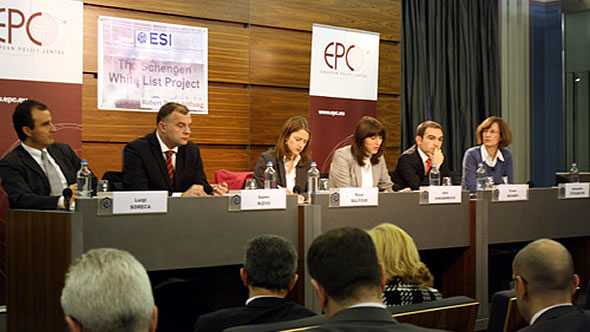ESI/EPC event in Brussels: "Visa liberalisation in the Balkans: time for the breakthrough"

At the first ever conference in Brussels on the visa liberalisation process for the Western Balkans, ESI senior analyst Alexandra Stiglmayer said the results achieved are better than anyone anticipated a year ago. It is virtually certain that Macedonia, Montenegro and Serbia will enjoy visa free travel from 19 December 2009 on, while Albania and Bosnia and Herzegovina have a good chance to get visa-free travel mid-next year. Only Kosovo's visa future is uncertain, she said, which must urgently change. "Kosovo must have the opportunity to carry out the same far-reaching reforms as the other countries and be rewarded with visa-free travel," she said.
The conference on 19 November was organised by the ESI in cooperation with the European Policy Centre. Some 100 people attended it, mostly officials from EU institutions, representations of EU member states in Brussels, and missions to the EU of the Balkan governments.
Besides Alexandra, the panellists were Ana Vukadinovic, adviser to the Prime Minister of Montenegro; Samir Rizvo, Assistant Minister ofSecurity, Bosnia and Herzegovina; Fisnik Rexhepi, Senior Adviser to the Minister of Interior of Kosovo, and Luigi Soreca, head of the unit 'External Relations and Enlargement' at the European Commission's Directorate-General Justice, Freedom and Security. The event was moderated by Rosa Balfour, Senior Policy Analyst with the EPC.
Alexandra presented ESI's White Schengen List Project and explained that the transparency of the visa liberalisation process, which ESI has created, has allowed the media, NGOs and the public in the Balkan countries to follow the process and, when needed, to put pressure on the governments; and that is has made sure that the Commission and EU member states had to be "strict, but fair". "We wanted to make sure that the member states acted based on achievements of the Balkan countries, and not based on which Balkan country has more influential friends among the member states," Alexandra said.
As regard Kosovo, she said first tentative steps have been taken when the Commission proposed on 14 October to open a "visa dialogue with the perspective of eventual visa liberalisation" with Kosovo. She demanded that Kosovo must now be given a roadmap. She emphasised that visa policy is status neutral, referring to the EU's intention to lift the visa requirement for the citizens of Taiwan, which has not been recognised by a single EU member state. Alexandra also mentioned a new ESI discussion paper on Kosovo's visa situation.
In conclusion, Alexandra listed a few positive "side effects" of the visa liberalisation process:
- Travelling to the EU without needing a visa will revamp EU support and enthusiasm in the region, giving citizens the feeling that EU wants them and is waiting for them;
- The current visa liberalisation process is a best-practise example of EU conditionality: clear conditions, a clearly structured process with clear deadlines and assessments based on the same criteria, and a "juicy carrot" as the reward at the end;
- The whole process has been an exercise in accession negotiations: both concerning the requirements, which are part of the JHA acquis, and concerning the design of the process;
- Concrete elements have been put in place in the Balkans to fight organised crime, corruption and illegal migration, making the whole EU safer.
ESI and EPC are grateful to the Robert Bosch Stiftung, which is the main donor of the White Schengen List Project and has also financially supported the conference.
Summary by the European policy Centre of the Policy Dialogue (19 November 2009)
